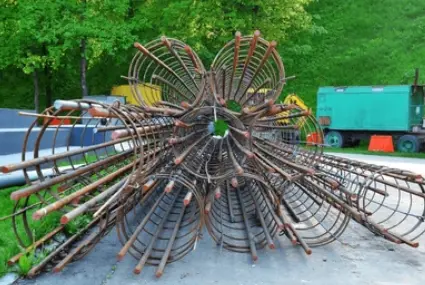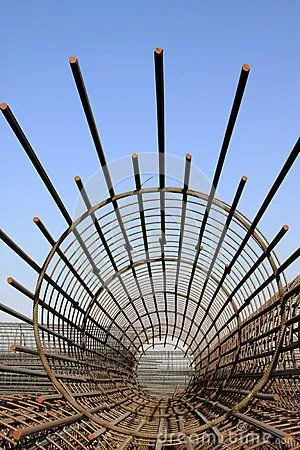Pile cages are used to reinforce deep foundations like bored piles or drilled shafts. These cages are built from steel reinforcement bars, shaped into a cage-like frame. After placing the cage into a drilled hole, concrete is poured around it. This forms a strong foundation that transfers building loads to deeper, more stable ground.
Each part of a reinforcement cage helps it work as a strong and reliable support system:
Main (Longitudinal) Bars
These vertical bars carry most of the structural load. They give strength and stiffness to the pile.
Hoops or Helical Stirrups
These are wrapped around the main bars. They keep the cage in shape and add shear resistance.
Lifting Hooks or Bars
These help move and lower the cage into place. They also support correct alignment during rebar cage installation.
Spacers and Centralizers
These hold the cage in the right position inside the borehole. This ensures full concrete coverage around the steel.

Before building or installing a pile cage, consider the following:
Keep enough concrete cover to protect the steel from rust.
Choose bar size and spacing based on load and soil conditions.
Match cage length to the pile type—full-depth for friction piles or partial for end-bearing piles.
Most builders prefer pre-fabricated reinforcement cages to save time and ensure accuracy. Here’s the basic process:
Cut and bend steel bars to the required shape.
Assemble the main and transverse bars into a cage.
Tie or weld them using steel wire or welding machines.
Inspect the cage for alignment and correct spacing.
Working with a skilled reinforcing steel supplier improves the quality and delivery time of these cages.
Installing a pile cage involves several clear steps:
Drill the Borehole using rotary or percussion tools.
Clean the Hole to remove mud or loose soil.
Lower the Cage into place using a crane or lift.
Pour the Concrete through a tremie pipe to avoid air gaps.
Set the Cage securely within the concrete to form the final reinforced pile.
You’ll find pile steel cages in many types of projects:
Building Foundations for towers, commercial buildings, and homes on soft soil
Bridge Supports, including piers and abutments
Marine Structures like docks, jetties, and offshore platforms

Pile cages help spread the load evenly. They also resist bending, twisting, and shifting forces, which adds stability.
Proper concrete cover protects the steel inside. This reduces rust, stops cracks from spreading, and improves durability.
Builders use reinforcement cages in all types of soil and across industries. They can be custom-built to meet specific site needs.
Using pre-fabricated cages speeds up the job. It also reduces mistakes and makes quality control easier.
Built-in hooks and spacers make the cage easier to lift and place. This lowers the risk of damage during installation.
Spacers keep the cage centered so concrete covers it fully. This helps the steel bond better with the concrete and carry loads effectively.
Pile cages improve flexibility. They help buildings handle stress from earthquakes, wind, and heavy machinery.
A well-made pile cage plays a major role in building safe and long-lasting foundations. Whether you’re working on a high-rise, bridge, or marine structure, a solid concrete reinforcement solution starts with the right cage.
To get the best results, work with an experienced reinforcing steel supplier who can deliver high-quality steel reinforcement and reliable rebar cages tailored to your project.
Pile cages are more than just assemblies of steel—they are critical to the strength, safety, and success of any deep foundation. When sourced from a reliable reinforcing steel supplier, built to spec, and installed with care, they provide unmatched performance in even the most demanding environments.
Whether you’re constructing a bridge, a high-rise, or a marine platform, the right concrete reinforcement solution starts with a well-designed pile cage.